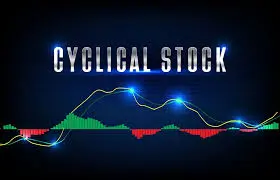The share market is a dynamic environment influenced by various factors, from company earnings and market sentiment to macroeconomic conditions. Among the various types of stocks traded, cyclical stocks are particularly sensitive to the health of the broader economy. These stocks typically belong to companies in industries like energy, consumer goods, manufacturing, and travel—industries that flourish when the economy is booming but suffer during downturns.
However, what happens to cyclical stocks during major financial crises, and more importantly, how do they perform over the long term? In this blog, we’ll explore how major financial crises impact the performance of cyclical stocks and how investors can navigate this turbulence for long-term gains.
1. Understanding Cyclical Stocks
Cyclical stocks are highly correlated with the economy’s performance. When the economy is strong, businesses and consumers spend more, boosting revenues for companies in sectors like:
- Automobiles
- Airlines
- Energy (like Adani Power)
- Consumer Discretionary Goods
Conversely, during a recession or a financial crisis, demand in these sectors drops sharply, which negatively impacts these stocks.
Examples of cyclical stocks include car manufacturers, airlines, and energy companies, which tend to perform better when people have more disposable income and confidence in the economy. However, when economic activity slows down, these sectors are often the first to be hit, causing their stock prices to decline.
How Cyclical Stocks Work:
- Expansion Phase: During an economic expansion, cyclical stocks tend to perform very well. Investors pour money into these companies as consumer spending rises, leading to strong earnings.
- Recession Phase: When a recession hits or during a financial crisis, cyclical stocks are typically the first to suffer. Consumers cut back on non-essential spending, and businesses reduce their investment in new projects, affecting industries like energy, travel, and luxury goods.
In the context of a company like Adani Power, which operates in the energy sector, the company’s stock price could be affected by fluctuations in economic activity. For instance, during periods of growth, energy demand is high, positively impacting theadani power share price. However, during a downturn, reduced industrial activity could lead to a dip in the demand for power, thus affecting the stock price.
2. How Financial Crises Impact Cyclical Stocks
Major financial crises have a profound impact on cyclical stocks, given their sensitivity to economic conditions. Let’s explore how financial crises typically affect these stocks:
a. Sharp Declines During the Crisis
During major financial crises, such as the 2008 Global Financial Crisis, cyclical stocks often experience steep declines in value. This happens because a financial crisis reduces consumer and business confidence, leading to lower spending, less investment, and reduced demand for the products and services offered by companies in cyclical industries.
For example, during the 2008 crisis, stocks in sectors like energy, automobiles, and travel took a significant hit as the global economy contracted. Investors pulled out of cyclical sectors, seeking safer assets like bonds or defensive stocks (e.g., utilities, consumer staples).
b. Impact on Earnings
Earnings for cyclical companies are directly tied to economic performance. When a financial crisis hits, earnings tend to drop significantly, further pushing slide insights down stock prices. For energy companies like Adani Power, the reduced demand for electricity, fuel, and energy products during a crisis means lower revenues, which translates into reduced stock performance in the short term.
c. Volatility in the Share Market
Cyclical stocks are known for their volatility. During financial crises, this volatility becomes even more pronounced. The share market tends to be more volatile during crises, and cyclical stocks, given their sensitivity to economic changes, are often at the center of this volatility. Investors tend to flee these stocks in times of uncertainty, leading to rapid sell-offs.
d. Investor Sentiment
Investor sentiment during a crisis typically shifts towards risk aversion. As a result, cyclical stocks, which are viewed as riskier because of their reliance on economic growth, often see a decline in investor interest during and immediately after a crisis. Investors instead flock to safer, more stable stocks, such as utilities or consumer staples, which are considered less vulnerable to economic downturns.
3. The Recovery Phase and Long-Term Performance of Cyclical Stocks
Despite their poor performance during financial crises, cyclical stocks often rebound strongly once the economy begins to recover. This is where long-term investors can capitalize on the cyclical nature of these stocks. Let’s examine the recovery phase and the factors that influence the long-term performance of cyclical stocks:
a. Strong Rebound During Economic Recovery
Once the economy moves out of a recession and into a recovery phase, cyclical stocks often experience a strong rebound. This is because, as economic activity picks up, demand for goods and services in sectors like energy, automobiles, and consumer discretionary goods increases. Investors who buy cyclical stocks at the bottom of the crisis can potentially see significant gains as the share market recovers.
Take Adani Power, for example. During periods of economic recovery, energy demand tends to increase, leading to better financial performance for the company. This improvement in earnings can lead to a rise in the Adani Power share price as investor confidence returns.
b. Long-Term Outperformance
In the long term, cyclical stocks can offer attractive returns, especially if investors buy them during a downturn and hold them through the recovery phase. Historically, cyclical stocks have outperformed other types of stocks during periods of economic expansion. While they may experience short-term losses during a financial crisis, their potential for growth during economic upturns makes them appealing to long-term investors.
c. Patience Is Key
Investing in cyclical stocks requires patience. Financial crises can be prolonged, and it may take several years for cyclical stocks to recover fully. However, for investors willing to take a long-term view, the rewards can be significant. Historically, those who hold onto cyclical stocks during the tough times and ride out the volatility tend to be rewarded once the economy recovers.
4. Navigating Financial Crises: Strategies for Cyclical Stocks
Given the volatility of cyclical stocks during financial crises, it’s important to have a clear strategy when investing in these stocks. Here are some tips:
a. Diversify Your Portfolio
While cyclical stocks can offer attractive long-term gains, it’s important to diversify your portfolio to reduce risk. By including a mix of cyclical, defensive, and growth stocks, you can protect yourself from the worst effects of a financial crisis while still maintaining exposure to potential gains during economic recoveries.
b. Look for Strong Fundamentals
Not all cyclical stocks are created equal. During a financial crisis, companies with strong balance sheets, low debt levels, and solid management are more likely to survive and recover. When investing in cyclical stocks during a downturn, look for companies with these characteristics to increase your chances of long-term success.
c. Buy During the Dip
One of the most effective strategies for cyclical stocks is to buy them during the dip—when the economy is in a downturn, and stock prices are at their lowest. While this requires a degree of risk tolerance, investors who buy cyclical stocks at their lowest point during a crisis can potentially see significant gains when the economy recovers.
Conclusion: Cyclical Stocks, Financial Crises, and Long-Term Success
Cyclical stocks are undoubtedly more volatile and susceptible to downturns during major financial crises. However, their ability to rebound strongly during periods of economic recovery makes them an attractive option for long-term investors.
In the share market, where fortunes can shift rapidly during financial crises, understanding the nature of cyclical stocks and having a clear investment strategy is key. Companies like Adani Power, which operate in cyclical industries like energy, may experience significant short-term losses during a crisis, but their long-term potential remains strong as the economy recovers.
So, whether you’re tracking the Adani Power share price or looking to invest in other cyclical stocks, remember that while financial crises bring challenges, they also present opportunities for those with patience and a clear understanding of market cycles.




